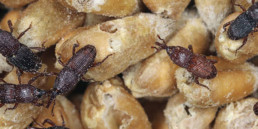The overall objective of the IPMorama project is to deliver a more sustainable food production system. It will be a major driver to reduce pesticide usage in conventional agricultural systems, and to enable the viable expansion of organic systems to one quarter of all agricultural production in the EU. This will be achieved by development of a “practice ecosystem” that supports the breeding, deployment and uptake of varieties that are designed to underpin Integrated Pest Management (IPM) approaches for important diseases/pests in wheat, potatoes and grain legume species (soybean, white lupin and pea) in Europe.
IPMorama is intentionally rooted in the starting point of current mainstream and emerging practices for variety-based disease and pest control, on the basis that the lead-time to effective impact will be minimised by building on this foundation. Farm-2-Fork timescales for pesticide reduction (targeting 2030) are ambitious, and even more so for the concept of using varietal resistance as a key component, since most breeding systems have a combined selection and product development cycle of over ten years. Thus, whilst we envisage many valuable approaches for varietal contribution to IPM in the future (e.g., greater compatibility with the soil microbiome and companion species), the “first wave” of effective strategies needs to be heavily rooted in the current system. The IPMorama approach seeks to initiate this first wave for its target crop/pests, and act as a model for other similar crop/pest systems in which similar starting points exist.



